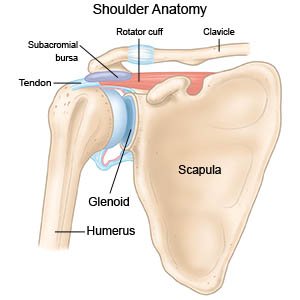Rotator Cuff Tendinitis
Medically reviewed by Drugs.com. Last updated on Apr 6, 2025.
Rotator cuff tendinitis is inflammation of the tendons in your shoulder joint. A tendon is a cord of tough tissue that connects your muscles to your bones. The rotator cuff is made up of a group of muscles and tendons that hold the shoulder joint in place.
 |
WHILE YOU ARE HERE:
Informed consent
is a legal document that explains the tests, treatments, or procedures that you may need. Informed consent means you understand what will be done and can make decisions about what you want. You give your permission when you sign the consent form. You can have someone sign this form for you if you are not able to sign it. You have the right to understand your medical care in words you know. Before you sign the consent form, understand the risks and benefits of what will be done. Make sure all your questions are answered.
Medicines:
- NSAIDs may be given to decrease swelling and pain.
- Steroids may be given to decrease inflammation. This may help relieve your pain. Steroids may be injected into the rotator cuff area.
Tests:
- X-rays may be used to check for an injury or other problem in your shoulder area.
- An MRI scan may be used to look for tendon injuries or other problems. You may be given contrast liquid to help the pictures show up better. Tell the healthcare provider if you have ever had an allergic reaction to contrast liquid. Do not enter the MRI room with any metal. Metal can cause serious injury. Tell the healthcare provider if you have any metal in or on your body.
- An ultrasound uses sound waves to show pictures on a monitor. An ultrasound of your shoulder may be done to look for damage to your tendons.
Treatment options
The following list of medications are related to or used in the treatment of this condition.
Surgery
may be needed if the pain and tightening in your shoulder do not go away. This may also be done if pain worsens or is so severe that it affects your daily activities. During surgery, your healthcare provider may remove bone spurs and inflamed tissue around the shoulder.
RISKS:
Even after treatment, the shoulder may not move the way it did before.
CARE AGREEMENT:
You have the right to help plan your care. Learn about your health condition and how it may be treated. Discuss treatment options with your healthcare providers to decide what care you want to receive. You always have the right to refuse treatment.© Copyright Merative 2025 Information is for End User's use only and may not be sold, redistributed or otherwise used for commercial purposes.
The above information is an educational aid only. It is not intended as medical advice for individual conditions or treatments. Talk to your doctor, nurse or pharmacist before following any medical regimen to see if it is safe and effective for you.
Learn more about Rotator Cuff Tendinitis
Treatment options
Care guides
- Abrasion
- Calcific Tendinitis
- Laceration
- Muscle Strain
- Rotator Cuff Injury
- Rotator Cuff Tendinitis
- Shoulder Dislocation
Symptoms and treatments
Further information
Always consult your healthcare provider to ensure the information displayed on this page applies to your personal circumstances.
